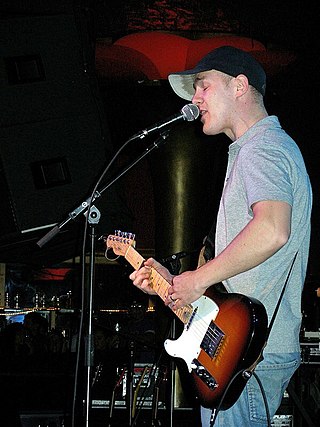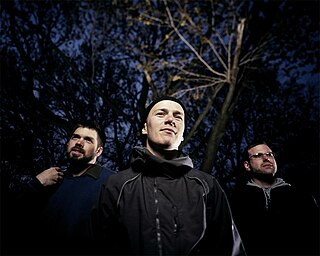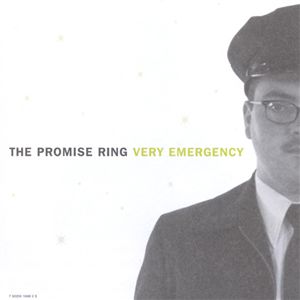Emo is a music genre characterized by emotional, often confessional lyrics. It emerged as a style of hardcore punk and post-hardcore from the mid-1980s Washington, D.C. hardcore scene, where it was known as emotional hardcore or emocore. The bands Rites of Spring and Embrace, among others, pioneered the genre. In the early-to-mid 1990s, emo was adopted and reinvented by alternative rock, indie rock, punk rock, and pop-punk bands, including Sunny Day Real Estate, Jawbreaker, Cap'n Jazz, and Jimmy Eat World. By the mid-1990s, Braid, the Promise Ring, and the Get Up Kids emerged from Midwest emo, and several independent record labels began to specialize in the genre. Meanwhile, screamo, a more aggressive style of emo using screamed vocals, also emerged, pioneered by the San Diego bands Heroin and Antioch Arrow. Screamo achieved mainstream success in the 2000s with bands like Hawthorne Heights, Silverstein, Story of the Year, Thursday, the Used, and Underoath.

The Promise Ring was an American rock band from Milwaukee, Wisconsin, that is recognized as part of the second wave of emo. Among various other EPs and singles, the band released four studio albums during their initial run: 30° Everywhere (1996), Nothing Feels Good (1997), Very Emergency (1999), and Wood/Water (2002). Their first two albums solidified their place among the emo scene; their third effort shifted toward pop music, while their final record was much more experimental in nature. The band initially broke up in 2002 and has reunited sporadically since then to perform live, but no new material from the band has since been released. They were last active for a live performance in 2016.

Maritime is an American indie pop band formed in 2003 after the breakup of The Promise Ring and The Dismemberment Plan.

Frame & Canvas is the third studio album by American rock band Braid. It was released on April 7, 1998, through Polyvinyl Record Co. After the release of the band's second studio album, The Age of Octeen (1996), drummer Damon Atkinson replaced Roy Ewing due to him being unable to commit to touring. Recording sessions took place at Inner Ear Studios in December 1997, with J. Robbins helping with production during the sessions. The album is an emo and post-hardcore release, for which the lyrics were co-written by vocalist/guitarists Chris Broach and Bob Nanna, or solely wrote by Nanna.

Orange Rhyming Dictionary is the debut studio album by American rock band Jets to Brazil, released October 27, 1998 on Jade Tree. Following the break up of Jawbreaker, frontman Blake Schwarzenbach moved to New York City, and formed Jets to Brazil with bassist Jeremy Chatelain and drummer Chris Daly. J. Robbins was drafted in to produce the band's debut album at Easley Studios in Memphis, Tennessee. With Orange Rhyming Dictionary, Schwarzenbach moved away from the punk rock sound of Jawbreaker into indie rock and post-hardcore.
Owls is an indie rock band from Chicago, Illinois. They were initially active from 2001 to 2002 and reunited in 2012. The band is composed of the original lineup of the emo band Cap'n Jazz excluding guitarist Davey von Bohlen, who had left to form The Promise Ring. The lineup has included brothers Tim Kinsella and Mike Kinsella, guitarist Victor Villareal and bassist Sam Zurick. Tim Kinsella and Zurick have also played together in Joan of Arc and Make Believe. Villarreal and Zurick played together in the instrumental rock group Ghosts and Vodka. The band signed to Jade Tree on May 3, 2001, and released their debut on July 31.
Decibully was an indie rock band based out of Milwaukee, Wisconsin that formed in 2001 and played their final show early in 2011.

30° Everywhere is the debut studio album by American rock band the Promise Ring. It was released in 1996 on Jade Tree.

The Horse Latitudes is an EP by the emo band The Promise Ring. It was released in 1997 on Jade Tree Records. The album was released between their debut album 30° Everywhere and their hit record Nothing Feels Good.

Very Emergency is the third studio album by American rock band the Promise Ring, released on September 28, 1999 through the label Jade Tree. Following the release of their second studio album Nothing Feels Good (1997), bassist Scott Beschta was replaced by Tim Burton. After a van accident, which resulted in a six-week break, Burton was replaced by Scott Schoenbeck. The band recorded their next album at Inner Ear Studios in Washington, D.C., co-producing it with J. Robbins. Very Emergency is a power pop and pop rock album that moves away from the emo style of their earlier works. It continued the sound of the Boys + Girls (1998) EP, and was compared to the work of the Lemonheads, the Pixies, Soul Asylum and the Wedding Present.

Wood/Water is the fourth and final studio album by American rock band the Promise Ring. It was released by Anti- on April 23, 2002. While touring in support of their third studio album, Very Emergency (1999), the Promise Ring were due to leave for a European tour; frontman Davey von Bohlen was diagnosed with meningioma on the day of departure. As a result of a post-surgical infection, the band could not tour for the remainder of 2000. In early 2001, the Promise Ring made demos with Kristian Riley, and then recorded a track with producer Mario Caldato Jr. in Los Angeles, California. The Promise Ring flew to the UK for six weeks of recording with Stephen Street, before returning to Milwaukee, Wisconsin for further recording. The album moved away from the emo sound of the band's past works into alternative country, indie rock, and pop territory.

Burritos, Inspiration Point, Fork Balloon Sports, Cards in the Spokes, Automatic Biographies, Kites, Kung Fu, Trophies, Banana Peels We've Slipped On, and Egg Shells We've Tippy Toed Over, more commonly known as Shmap'n Shmazz, is the only full-length studio album by the American emo band Cap'n Jazz. It was released in 1995 on the record label Man With Gun. Cap'n Jazz's lineup at the time of recording comprised Tim Kinsella on lead vocals, Davey von Bohlen and Victor Villarreal on guitar, Sam Zurick on bass guitar, and Mike Kinsella on drums.

Nothing Feels Good: Punk Rock, Teenagers and Emo is a book by Andy Greenwald, then a senior contributing writer at Spin magazine, published in November 2003 by St. Martin's Press. Greenwald documents the history of the emo genre from its mid 1980s origins in Washington, D.C. to a more recent crop of bands, such as Thursday and Dashboard Confessional. The book received generally favorable reviews from music publications, with it appearing on best-of lists by Alternative Press and NME.

Davey von Bohlen is an American musician and songwriter. He is best known for serving as lead vocalist and guitarist of the emo band The Promise Ring and also as guitarist and backing vocalist in short-lived cult band Cap'n Jazz originally from 1993 to 1995.

Jersey's Best Dancers is the third studio album by American punk rock band Lifetime. It was released on June 10, 1997, through Jade Tree Records.

Do You Know Who You Are? is the first and only studio album by American rock band Texas Is the Reason. After finalizing their line-up, they wrote and released their self-titled debut EP in late 1995. Following that, they began recording their debut album at Oz Studios in Baltimore, Maryland, co-producing it with Jawbox member J. Robbins. Preceded by an east coast tour with labelmates Gameface, Do You Know Who You Are? was released on April 30, 1996 through Revelation Records. It was promoted with a European tour with Samiam, two US tours, and a tour of Germany with Queerfish and Starmarket. Shortly after the Germany stint, the group broke up.
Emo pop is a fusion genre combining emo with pop-punk, pop music, or both. Emo pop features a musical style with more concise composition and hook-filled choruses. Emo pop has its origins in the 1990s with bands like Jimmy Eat World, the Get Up Kids, Weezer and the Promise Ring. The genre entered the mainstream in the early 2000s with Jimmy Eat World's breakthrough album Bleed American, which included its song "The Middle". Other emo pop bands that achieved mainstream success throughout the decade included Fall Out Boy, the All-American Rejects, My Chemical Romance, Panic! at the Disco and Paramore. The popularity of emo pop declined in the 2010s, with some prominent artists in the genre either disbanding or abandoning the emo pop style.

Owls is the debut studio album by American rock band Owls, which was released on July 31, 2001, through Jade Tree. After the disbandment of Joan of Arc, frontman Tim Kinsella reunited with the former members of Cap'n Jazz to form Owls. They recorded with Steve Albini at Electrical Audio in Chicago, Illinois, in April 2001. The album is an emo and indie rock record that has been compared with the works of Ghosts and Vodka, Pavement, and Captain Beefheart.

Some Boys Got It, Most Men Don't is the fourth album released by the North Vancouver punk band d.b.s. It was released by New Disorder Records in June 1999. This is the first d.b.s. recording to feature new bassist Ryan Angus, who replaced Dhani Borges.














